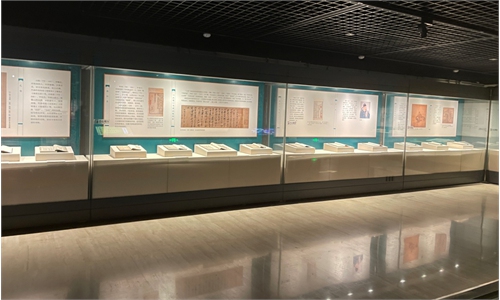"Read ten thousand books, and your pen will be guided as if by the gods" is an ancient Chinese idiom that can be seen in students' textbooks. China's Ministry of Education has published an action plan to further promote reading among students across the nation. With new and diverse book recommendations, the reading scene is expected to see a revival not only at schools, but also across society. To contribute to this endeavor, the Global Times launched "My Reading Life" essay contest for school students.
On World Book Day on April 23, we start publishing the excellent essays contributed to us by our student readers across and beyond China. Please pick up a pen and share your stories with us at reading@globaltimes.com.cn
Photo: VCG
As an 11th grade student who wants to write but always feels like my writing is lacking, I am always looking for guidance that will improve my skills. I was looking for inspiration that would help me win the "writing Olympics" when my teacher noticed I was having trouble. One day, she gave me a book called The Literary Mind and the Carving of Dragons and asked me to read it carefully.
I gave it all my attention, reading it one chapter after another non-stop. Before I even reached the halfway point, I had already come to understand the value of this work. I understood why my teacher had recommended this book to me.
The Literary Mind and the Carving of Dragons is a textbook on how to write good essays written by Liu Xie, a writer from the Liang Dynasty (502-557). The Literary Mind and the Carving of Dragons consists of 10 volumes and 50 chapters. These can be divided into two parts - each with 25 chapters - that cover four sections: general introduction, stylistic theory, creative theory and critical theory. The work discusses the basic methods of literary creation and the methods and attitudes of critical appreciation.
Eagle vs pheasant
I had a breakthrough when I read chapter 28. This chapter, called Feng Gu, was the key to solving my problem, breaking through my bottleneck in writing with its enlightening bangs. Feng Gu, literarily "wind" and "bone" but less literarily referring to an essay's "spirit" and "structure," is a basic concept in ancient Chinese literary theory. The essence of the theory requires that the description of literary works and the truth expressed in them complement each other at the aesthetic level. I think my bottleneck was how to naturally combine beautiful descriptions and truth. What attracted me the most about Liu's argument is that the author used vivid metaphors to clarify the relationship between these two concepts.
As a classic concept in ancient Chinese literature, feng gu is not that easy to understand, but Liu Xie was able to clearly show its meaning through the application of figurative language. First of all, the author uses the analogy of a pheasant and an eagle to illustrate what feng is. The author said that some essays with flowery rhetoric read well, but they are soft and powerless. Like wild pheasants, although they are plump and covered with dazzling colorful feathers, they can only fly as far as 100 steps due to a lack of strength. On the other hand, some essays are obscure but full of power. Like an eagle, although its feathers are a single color, it can soar into the sky because of its strong bones and vigorous spirit.
Then, the author clearly expresses his attitude toward these "pheasant" and "eagle" essays, further stating what he thinks about gu.
He notes that essays with attractive language but a lack of educational significance are like wild pheasants that have a gorgeous appearance but cannot fly high in the literary world. Meanwhile, an article with rigorous logic but a lack of grace is like an eagle flying in the literary world - too rigid to be accepted.
I think Liu's idea of feng is a vivid story and beautiful language, while gu is the truth behind it. Feng gu is the author's authentic attitude toward writing. As the author said, essays that are pheasants or eagles are not good essays. A really good essay should be like a phoenix, with moving rhetoric, but also rich in emotional impact and power. In addition to beautiful language and precise arguments, feng gu refers more to the mood or emotions that the author wants to convey and which the reader experiences between the lines of a work. The feng gu of the work is the feng gu of the author, which reflects the temperament of the author and conveys the author's understanding of life. It is not only a comprehensive expression of ambition and spirit, but a comprehensive expression of personal belief, ambition and temperance.
As I understood and reflected on the writing techniques taught in this chapter, I began to realize that famous writers create great works through touching pen strokes and the right truth.
Lu Xun, a well-known Chinese writer, is an outstanding representative of this. He uses exquisite language to describe the behavior and inner monologue of ordinary people, expressing the spirit of resistance belonging to that era. Lu Xun's writing is vivid and always reflects that the writer does not follow fixed literary customs, is not afraid of intimidation, is not limited by temptation, is not afraid of loneliness, does not lose courage or perseverance, and has the feng gu of a fighter of the nation.
Writing spirit
The essence conveyed by feng gu is not only reflected in the works of Chinese writers, but also in the works of foreign writers.
For example, Hemingway's Old Man and the Sea mainly tells the story of an old fisherman who has not caught a fish for 84 consecutive days. The gloomy weather, the furious sea, and the indomitable persistence of the old man immerse the reader in the story. The work not only draws in people, but also portrays the optimistic and persistent spirit of the elderly. The meaning between the lines expresses the author's praise for this noble quality, which is a type of what we call feng gu.
It can be seen from this that the feng gu discussed by Liu Xie is the goal that every writer hopes his or her work can achieve.
Among diff erent eras of great works, the way to present feng gu is diff erent. What these works have in common is that between the lines, they not only reveal the beauty of language, but also strongly project the noble personality of the author. I think that's the golden key that helped me improve fast in writing.
The author is a student at Beijing No.2 Railway Middle School



